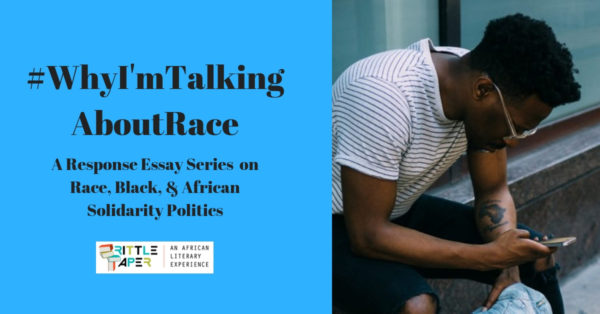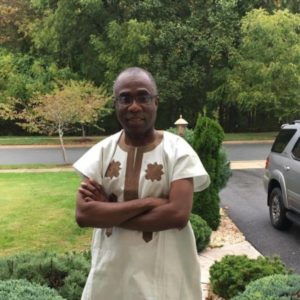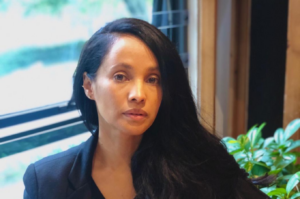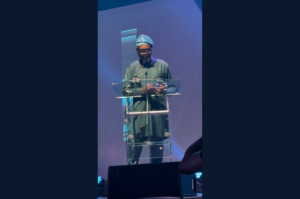
The South African writer Panashe Chigumadzi published an essay in Africa Is a Country, “Why I’m No Longer Talking to Nigerians About Race: On Writers, Empathy and (Black) Solidarity Politics,” which demands an uncomfortable conversation on race, Black, and African solidarity politics. Our #WhyI’mTalkingAboutRace series features responses. The first is by the Nigerian social and literary culture critic Ikhide R. Ikheloa.
The indifference to the missing Chibok girls in Nigeria, the country with the largest black population on the planet, is as much linked to the unpunished police shootings of unarmed black people in America as it is linked to the murder of black mine workers demanding better wages in South Africa as it is to extra-judicial killings in Kenya. All of these different attacks on black bodies—whether on African soil or outside of it—is not unrelated to white racial capitalism and coloniality which is sophisticated enough not to need the presence of white bodies to function. This is after all why, for example, African countries remain one of the world’s largest markets for skin lightening creams. It is why Africans still prize white intellectual labor and cultural output as supreme (whether we admit it or not). It is why a fluency in the colonizing languages of English, French, German, Portuguese, instead of our own indigenous languages, remains the true marker of not only of educatedness but sophistication and worldliness across the continent. It is why in times of emergency our governments will often choose to address foreign press before they address us, their people… All of us are suffering coloniality, it’s just that the significant presence of white bodies in South Africa and the United States make it easier to visualize.
—Panashe Chigumadzi, “Why I’m No Longer Talking to Nigerians About Race: On Writers, Empathy and (Black) Solidarity Politics”
1.
Advances in technology, the rise of prosperity Christianity, and the gentrification of thought and narrative—from traditional books to social media, for instance—have redefined, with much vigor, the level of consciousness and loyalty of the average Nigerian intellectual to fixed boundaries. Technology has broken down fixed walls and many Nigerian thinkers merely sleep in Nigeria while their minds, hearts, and wallets are attached to the West. Similarly, African literature is undergoing a gentrification, and it’s not all good.
This is no longer the literature of Christopher Okigbo—the towncrier is long dead. Today, the traditional expectation of the African writer as a strong voice and conscience of the people is disconnected from the reality, which is that as new markets for African writing open up, writers are increasingly catering to new constituents, many of whom are in the West. African writers have fanned out abroad, especially in the West, where they sell Africa-themed books but immerse themselves in the social anxieties of their buying audience. Africa seems to be a mere backdrop to their hustle, even as much of Black Africa broils with dysfunctions that would cause uprisings in the West.
There are very few contemporary essays by African authors that are introspective and aimed at truly starting a conversation on the many social and economic quagmires in Africa. The rest seem mostly silent about Africa burning, but tend to cry louder than the bereaved when it comes to addressing the West’s issues. It is in this regard that Panashe Chigumadzi’s recent essay, “Why I’m No Longer Talking to Nigerians About Race: On Writers, Empathy and (Black) Solidarity Politics,” breaks new ground and is an important piece that I heartily recommend to all those who think about the place of Africa and Africans in today’s world. It starts a real conversation about what should be the role and priorities of the African Writer.
Chigumadzi takes to task many Nigerians’ seeming lack of interest and, sometimes, contempt and lack of empathy for the average African American’s struggle for racial equity and social justice, citing as examples her conversations with the Nigerians she has come across, many of them writers like her. She provides crucial historical context for several of her views and appropriately makes the connection between institutional racism and several of the dysfunctions that plague much of Black Africa today. Like Obierika in Chinua Achebe’s Things Fall Apart, she has thought hard about these things. Chigumadzi has my deep respect and admiration for penning an important marker for a deep conversation that needs to be had. I salute her for her industry and for thinking about these things and for her courage in publicly articulating these anxieties. It is time to talk about these things—and more.
2.
Many things must be put in context. Are Nigerians at home and abroad indifferent to the plight of African Americans? It depends on who you talk to. Chigumadzi’s essay is a long challenge to read and absorb because it is actually several essays in one that swing at all our cardinal points but stays on the surface of her anxieties because, ultimately, she fails to answer some questions: Why are things the way they are? Why should Nigerians care about a world so remotely far from theirs, a world that even with all its issues seems like heaven compared to the hell they occupy daily in Nigeria? It is complicated.
America is the elephant that is often the source of illuminating essays by the proverbial blind men. What you touch is often true, but the conclusions may be inappropriate because you have not touched or seen the universe of this vast but troubled country, America. It is true that there are many Nigerians who tend to be indifferent to the politics of race and identity in America, many who would scoff at the notion of taking a knee in protest against institutional racism in America, many who would proudly tell you that they live in White neighborhoods, their kids go to White schools, and they shop in White neighborhoods, as they point with disdain in the direction of where they imagine are blighted Black neighborhoods and wrecked schools.
Also, from my experience, the disrespect between continental Africans and African Americans can often be mutual; indeed it is a symptom of deep-seated anxieties within both groups that play out often when finite resources are discussed as in the recent case at Cornell University. It is therefore not surprising that some of the fiercest proponents of harsh anti-immigration policies are African Americans.
Yes, Chigumadzi is right: we should all care about the plight of the oppressed everywhere in the world. Being a person of color can sometimes be a terrifying experience, certainly a humiliating one. Every indignity, every attack against a person of color is an attack against our world, and, ideally, we must all resist oppression at every turn. We should not have to be convinced that African Americans deserve our support in their daily struggle against institutional racism. For it is not always altruistic: when a cop stops you on the streets, you are black, and you are most definitely not going to be exempted from the humiliation reserved for your race. Donald Trump’s coming has laid bare the deeply-rooted bigotry that props up America’s racist institutions daily. Institutional racism is the water damage that continues to threaten the very foundations of America. The elimination of institutional racism—and police brutality as a bloody symptom—is a noble fight to ensure that the other believes people of color are human beings and that equity of access is enshrined in everything we do and say in America.
However, context matters. The legacy of racism and discrimination has had the unintended effect of creating a Single Story when it comes to Black America. Unpopular opinion: Black America is not the doomed loser nation that one comes across in the single story of poverty and despair in the daily news. The annual buying power of African Americans is estimated to be at least 1.2 trillion dollars, which would make it a very powerful and wealthy nation if it were one. African Americans have excelled in every endeavor there is, from the presidency of the most powerful nation on earth to the lowliest job out there.
Sure, there is the opportunity gap that has created an achievement gap in academic achievement between African Americans and Whites and Asians; however, many African Americans also excel academically and even the worst elementary school in America has better amenities and opportunities than the best elementary school in Nigeria. The children in my village in Nigeria would love to have the issues that the children of Washington DC face in their public schools daily. In those schools, the roofs don’t leak, there is a well-paid teacher in every classroom, there are computers everywhere and, to the extent possible, no child is allowed to go hungry in school.
3.
Context matters.
Nothing prepares the African immigrant for America—nothing. Confronting America’s prejudice is a jarring and unsettling experience for the immigrant of color as I did at OLEMISS as a young graduate student. And yes, I did take the color of my skin for granted until I came to Mississippi in the early ’80s. Since then, it seems all one does is obsess about being Black and the baggage that comes with it, through no fault of mine. America was a war that I didn’t ask for. Mine was a complicated experience that left me obsessing about the notion of race, class, and the various intersections of identity. I was similarly conflicted when I visited South Africa to witness the pernicious effects on the poor of the new Black colonialism.
Many Nigerian intellectuals, especially those who reside in America, have a complicated but ultimately rewarding relationship with African Americans, and do heartily identify with their struggles. Chimamanda Ngozi Adichie is a good example: Google her advocacy and her politics. Her thoughts on feminism and empowerment are required reading in many schools in the West. Her relationship with the writer Ta Nehisi Coates reminds me of that between the late greats, Chinua Achebe and James Baldwin. Indeed, for the most part, writers of stature of Nigerian extraction have been very active in the advocacy for equality and equity not only in America but in the general West.
Many of these writers have appropriately used their star power to draw attention to an infuriating injustice in America by speaking out. This follows a long tradition of engagement by Nigerian intellectuals—and in the past, the Nigerian government—with the anti-Apartheid and civil rights struggles. Indeed, there was a time Nigerians felt the deep pain of Apartheid and segregation and shared the despair and helplessness with Black South Africans and Black Americans. Just as with South African activists, Black Americans found refuge in Nigeria when they needed it most. Just as Nigeria and her intellectuals supported the Mandelas of the time, so did they support the civil rights activists of the sixties. With money and the fury of the pen. James Meredith, the iconic civil rights activist who helped to force the integration of the University of Mississippi found refuge in the University of Ibadan, as did many others who sought exile in Nigeria and Ghana.
It has often been a symbiotic relationship; during the dark days of the Abacha regime in the ’90s, Nigeria’s pro-democracy movement enjoyed the support of star African American activists, most notably Randall Robinson, who was arrested right before my eyes by the police in front of the Nigerian embassy. Of course, at the same time, there were several African American leaders who supported the odious regime—and benefited from it. It is life.
My observation is that many African writers have immersed themselves in the West’s issues while ignoring the inferno blazing in their home countries. This is a huge problem. Standing on bully pulpits paid for by the West, they offer woke pronouncements on social issues abroad, to the throaty cheers of their Western sponsors. Earlier this year, Adichie implied that today’s America reminds her of the dark days of Nigeria under the military. America is in a bad place, true. Trump is a pest. But America is nowhere near where Nigeria was during the military era. African Americans at least have laws, structures and processes and, yes, the buying power to do something about what upsets them. We have nothing in Nigeria, certainly nowhere near what is available in America. Can you imagine 350 African Americans being slaughtered by the state and a governor proceeding to bury them in mass graves with not as much as a peep from America and her writers? Yes, my friends, that happened in 2015 in Nigeria: hundreds of Shiites were slaughtered because they dared to stop the convoy of an army general. They were buried in a mass grave by the governor of that state. Nigerian writers who would eagerly take the knee in America did absolutely nothing about this horror.
Well, they did.
They made the governor fund their literary festival and he was one of the keynote speakers at their shindig where they all looked on adoringly as he spoke about literature. And one of them just penned a hagiography in honor of the General whose army executed a genocide: a novel named The Legend of Buratai. Can you imagine this happening in America? Let me just say this: much of what passes for Nigerian Literature, internationally, is fully funded by the West. If the Western sponsors knew that Nigerian writing is now a front for fascism, that many writers are the ones penning talking points for the new darkness, they would immediately stop the flow of money to the new pen-wielding hustlers. We should also talk about these things.
In the name of democracy, Nigeria is fast slipping into anarchy. Unlike even the seediest part of Baltimore where I hang out, you don’t want to be out at night in too many parts of Nigeria. You are asking to be killed. The police is not your friend in Nigeria. Nigeria is in a bad place even as her writers are preoccupied with first world problems and Western literary prizes. As we write, Nigerian hospitals are locking up women unable to pay their childbirth bills. Where are our writers? They are in the West fighting over literary prizes and living it up with funds sourced from the West. We should talk about these things as well as talk about the injustices going on in our funders’ countries.
4.
This is the huge elephant in the room. Many Nigerian Writers are, as a collective, a loud proxy for “African Writers.” African writers have at best written themselves into irrelevance while they write to the test of dollar rich white audiences and preen on the world stage babbling about woke anxieties—A.K.A. First World Problems. Many Nigerian writers are the new Goebbels, writing talking points for the purveyors of evil. My mother would love to live in the seediest part of Baltimore. She would be happier there. I know. She has been there. She would love to live in Soweto. I know I have been there. Our children are dying in alien seas and deserts fighting to reach Europe and America.
This is the tragedy of South Africa, and a stinging rebuke to her Black ruling and intellectual class: Inequality is getting worse. The same could be said of many in former colonial states like Nigeria. Many poor Nigerians are unaware that Nigeria is a free country. Where are our writers’ voices? They are their white masters’ voices. Africa’s issues are beneath them; they soil their brand.
5.
My point? Chigumadzi’s admonition comes at a time when many are questioning the priorities of Africans who tend to pay more attention to the needs of the West than to Africa’s. Socrates Mbamalu asks: “Why are so many of us, not to mention our leaders, so quick to speak out when calamity strikes in the West, but we remain unmoved and silent about our continent’s own tragedies?” Lineo Segeote also asks: What is Africa’s stake in the Notre Dame fire? Hear her:
In a fair world, these facts would be no-brainers. But the world is not fair. We human beings have an affinity for taking care of our own, and only more so depending on how close we are to our own. Is it really that shocking that White people rallied together to rescue a symbol of their heritage, culture and civilization? Are we shocked that all most of us sent to Mozambique, Zimbabwe, and Malawi were thoughts and prayers and a meagre US$350,000 from the African Union? The statistics may be riddled with inconsistencies, but Africa’s middle class is growing. We actually can afford to take money out of our pockets to donate to worthy causes, and we do not have to be as rich as Europe to do so.
It is interesting: there is an anti-intellectual uprising against intellectuals, especially the public ones, by the young, especially those who see themselves as disenfranchised and cheated by a system that exists because of the collusion and perfidy of Nigeria’s thinkers with the thieving, ruling thug-elite. They see Nigerian intellectuals as privileged, largely self-serving, insincere characters who have used alien tools of empowerment to create free and comfortable spaces for themselves, while the issues that they rage about with beautiful words live and breathe free back home in Nigeria, like permanent parasites.
While our writers prattle on about colonialism and traveling the world, the poor and the dispossessed look around them at broken schools, hospitals and roads, and they see Nigerian intellectuals and writers parading cute pictures of their beautiful children and family on social media. The poor see the middle class in Europe and North America in good schools and neighborhoods abroad and they agree that they are all full of shit. I don’t much blame them. We may have created the monsters gnawing at our drawstrings.
I say to Chigumadzi: yes, it is truly all about priorities, and yes, there is a deeply hurtful irony in the fact that our writers have rented their voices to alien wars while ignoring the hell that is in our homes. I have said this before, but it bears repeating: As African writers, we must get off our high horses and help the people who denied themselves everything to save us from that which we now abhor. Does the African writer have an obligation to speak up about Africa’s issues? Absolutely. Memo to the African writer who proclaims his or her whiteness, err, humanity at every turn: If you want to be known as just another writer, simply write whatever truly rocks your boat. If you feel no obligation to be an African writer, by all means, stop being one. Be a plain vanilla writer living in the West. Why not write about America? Look out your window in America and write about deer gamboling on your manicured lawn. Look out your windows and write about the majesty of the land that adopted you and freed you from the harshness of Africa. Sing the praises of those that clothe and nurture you daily. And when you are done, chronicle and clothe their neuroses and anxieties with the awesome power of your words. If you are a writer and all your five books have been about suffering in Soweto, the white man should be forgiven for calling you an “African writer.” Get over it.
Yes, it is appropriate to ask of Nigerian intellectuals and writers: Where are your priorities? Anecdotally, Nigeria has more PhDs per square foot than most nations on earth, but that doesn’t translate to substance. We have invented little that is original, our research institutes are postcolonial relics, and most of our tertiary institutions are glorified secondary schools. After all these years, and with thousands of PhDs, Nigeria’s best works are still oral. Most PhD theses by Nigerian PhDs are eurocentric and of dubious value to advancing the present and the future of Nigeria. We must retool our educational system. Meanwhile, Nigerian democracy has been deadlier than its military reign.
Finally, we know now that the great African writers conference that was held at Makerere University in 1962 was covertly funded by the CIA. I can confidently say that if the writers of the time—Soyinka, Ngugi, etc.—had known of this subversive connection, they would not have been part of the conference. I cannot say the same for this generation of African writers. Many Nigerian writers I know of would not only take the money—they would invite the CIA director to come give a keynote speech on feminism, patriarchy, intersectionality, intersexuality, Africa Rising, and everything Woke under the sun. I have said my own. Come and beat me, I dey my house.
ABOUT THE WRITER
 Ikhide R. Ikheloa or Pa Ikhide is a social and literary culture critic who writes non-stop on various online media. He was a columnist with Next newspaper and Daily Times, Nigeria, where he held forth and offered unsolicited opinions on any and everything to do with literature and the world. He has been published in books, journals and online magazines and he predicts: “The book and the library are dying. Ideas live.” Find him on twitter @ikhide.
Ikhide R. Ikheloa or Pa Ikhide is a social and literary culture critic who writes non-stop on various online media. He was a columnist with Next newspaper and Daily Times, Nigeria, where he held forth and offered unsolicited opinions on any and everything to do with literature and the world. He has been published in books, journals and online magazines and he predicts: “The book and the library are dying. Ideas live.” Find him on twitter @ikhide.









Nigerians and America in the Age of George Floyd’s Rage - Arbiterz June 30, 2020 18:04
[…] I have said this before: Also, from my experience, the disrespect between continental Africans and African Americans can often be mutual; indeed it is a symptom of deep-seated anxieties within both groups that play out often when finite resources are discussed. It is not surprising that some of the fiercest proponents of harsh anti-immigration policies are African Americans. There are many rivers that run through our nations and join us with the African American nation, and I am not just talking about the middle passage and slavery. Just like with South Africa and apartheid, Nigerians are continuing victims of the institutional racism that inherited from colonialism. All the institutions that were inherited after Independence were set up to subjugate and oppress Nigerians as second-class citizens – the army, the police, the educational systems, etc. With very little exception they have not been re-tooled to meet the needs of modern-day Nigeria. My point? We have a huge problem back home. Sneering at African Americans will not solve our challenges. We need the more than they need us. It is a failure of leadership. […]